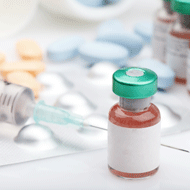VMD reports drug supply problems

The VMD has revealed that there are currently supply problems with a number of veterinary products. (Stock photo)
The Veterinary Medicines Directorate (VMD) has revealed there are currently supply problems with a number of veterinary products, including leptospirosis vaccines for cattle and local anaesthetic products containing procaine hydrochloride.
Supply problems exist for the following products:
Vaccines for Leptospira hardjo and Leptospira borgpetersenii
There are supply issues with two leptospirosis vaccines authorised in the UK for use in cattle. Supply problems are expected to be resolved in October 2019. In the meantime, the VMD is accepting applications to import an EU alternative, BioBos L. injection suspension for cattle, which is licensed in the Czech Republic, and Spirovac, which is licensed in the USA.
Local anaesthetic products containing procaine hydrochloride
VMD said it is aware of UK availability issues with some of these products. Information on authorised products are available on the VMD’s product information database. Suppliers have advised that the UK authorised Pronestesic 40mg/ml / 0.036mg/ml Solution for Injection for Horses, Cattle, Pigs and Sheep, is available to meet present demand.
Viper Venom Antiserum for veterinary use (adder bite antivenom)
There are no viper venom antiserums licensed in the UK for treating adder bites in animals. VMD accepts applications to import European Viper Antiserum from Biomed (Poland) and the Institute of Immunology, Zagreb (Croatia). VMD said anyone wishing to import should contact the manufacturer before submitting an application to ensure they can supply the quantity needed.
In urgent cases, antivenom may be supplied, purchased and used prior to the special treatment certificate being obtained from the VMD.
ACP injection 10mg/ml solution for injection
This product is indicated for anaesthetic premedication, tranquillisation and sedation in horses. It is not known when stocks will be available. Applications are currently accepted to import this product for use in horses only. Two EU alternatives are available - Calmivet solution for injection (5mg/ml) and Vetranquil 1% solution for injection (10mg/ml).
For information on prescribing under the cascade, visit the VMD’s website.



 The latest
The latest